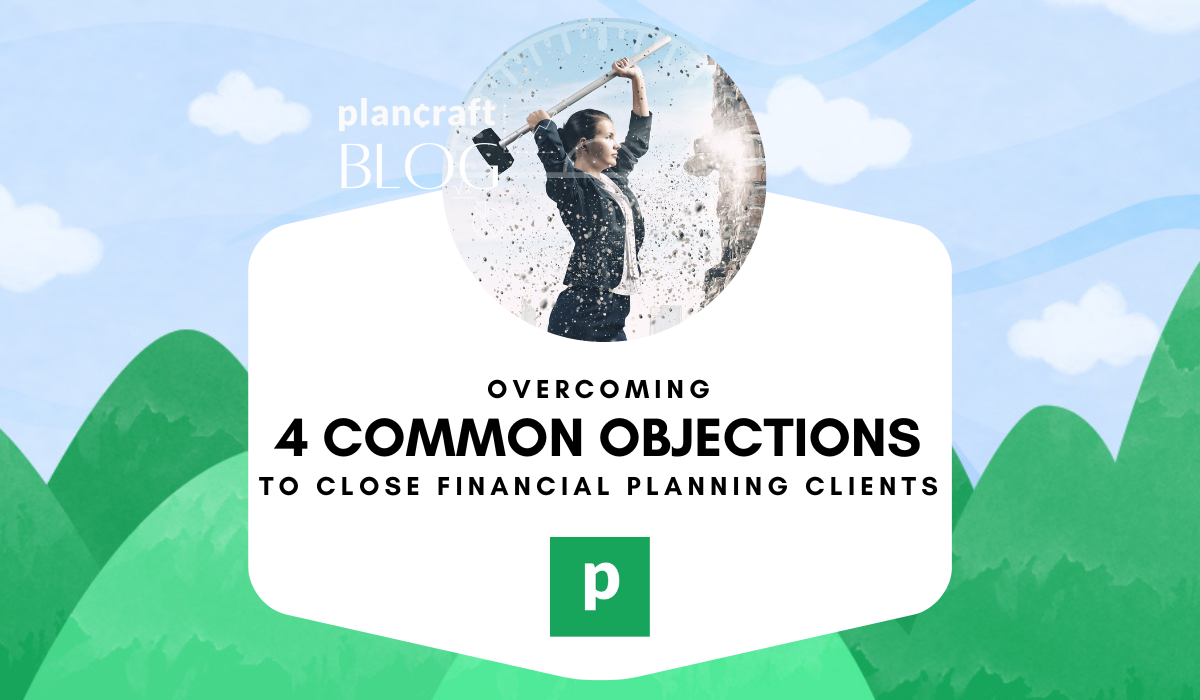The potential clients we come across here at Planswell have a wide variety of experiences with financial services. "We see everything from their dad's favorite stock picks to their best friend’s sister’s mother-in-law who sold them life insurance. Some potential clients have advisors at their local bank branches or through personal connections," says Planswell Product Operations Manager Abdullah Hussain. To the inexperienced advisor, being “already taken” may seem like a non-starter.
Not so fast. Winning the business of someone who already works with an advisor is not impossible. Some advisors may even find it is an easier conversation to have versus the prospecting calls to folks who are completely in the dark on financial planning concepts.
"Most of the people you will want as clients already have an advisor," says Ermos Erotocritou, CFP®, CPCA. "If they already have an advisor, there’s a good chance they already have assets or are on a path of acquiring assets."
Someone else has already done the work of educating them on the value. Now, you simply need to find out if the value they are receiving from their current advisor is meeting their expectations, or if there is an opportunity to serve them better in any way.
Your Competitive Advantage
Better does not mean cheaper. There are endless ways to do better, from having an easier rapport to expanded service offerings like disability insurance. Do you have expertise within a niche that resonates with the prospect? Do you have lifestyle similarities that make you an obvious choice?
Patty Carr, a Plancraft facilitator, says it’s important to her that her financial advisor has a similar lifestyle. Patty and her advisor are about the same age, both were entrepreneurs throughout their careers, and both raised families of the same size, among other similarities. When her advisor makes recommendations, Patty asks, “Is this what YOU do?” She’s reassured knowing her advisor has first-hand experience with the solutions Patty is considering.
On the contrary, being at different life stages can be a competitive advantage. A young Planswell partner told us he closes older clients when he points out their current advisors will retire right when they need them most.
You might not even be aware of your competitive advantage until you build some rapport. Share things about your life and you will be surprised by what resonates. Some examples that have helped Planswell partners:
-
- Growing up in a military family
- Experience with clients who operate family farms
- Having a spouse who’s a schoolteacher
- Caring for a disabled family member
- Putting a child through dental school
The list goes on and on. Keep an open mind about what might resonate with your prospective clients. It wasn’t long ago when the best advisor was the closest advisor. In today’s virtual world, that’s no longer the case. Clients can choose whom they work with based on any criteria that’s important to them.
The Long Game
The longer someone is in your pipeline, the more opportunity to share these details about yourself. “Common ground” info is great content for newsletters, social media posts, and as anecdotes in your blog.
"One thing I’ve found to be very effective for my advisors is teaching them how to play the long game," says Ermos.
"It’s surprisingly common for prospects to have a falling out with their advisors. Once you establish yourself as the second choice, it's simply a numbers game", Ermos explains. "If you’re doing a proper job prospecting, you will be second choice for at least 100 qualified leads. If only 10% question their existing advisor, that’s ten new clients coming your way."
For more on playing the long game, check out Ermos' article, How To Re-Engage Old Prospects in Your CRM.
Objections
Winning business away from another advisor is not without challenges, obviously. You will come across predictable objections, but they’re not insurmountable. Here's what Planswell partners have heard when talking to prospects with an existing advisor, and how we recommend responding:
1. Objection: It will be too much effort to move my business elsewhere.
One of the biggest challenges of onboarding any client is getting them to follow through with their “homework.” Your prospective client has no idea what it takes to move investment accounts and the like, and they may assume it will take more effort than it’s worth. Pre-empt this concern by reassuring them it’s actually quite simple, the heavy lifting will fall on you, and you have experience doing it. You may even explain the process in simple terms upfront, before they form this objection in their minds.
2. Objection: I don’t want new products pushed on me.
Adverse to “being sold”, a prospective client may shut you down before you even have a chance to explain how you can add value. That’s why we preach rapport building , the number one goal of the first call, to Planswell partners. If you approach your initial conversation as purely transactional, you will burn a lot of good opportunities. Start with making a genuine connection and you will build an impressive pipeline of new clients who will come to you when they’re ready for you. When you build actual relationships with your clients, you’ll safeguard your firm from other advisors poaching your clients and your work will be more rewarding. The relationship starts on your very first call.
3. Objection: You are probably more expensive than my advisor.
There are a couple of easy ways to overcome this objection. For starters, offer a free second opinion. When approaching Planswell households, our partners have the opportunity to review the free financial plan the prospect received from Planswell. This is a great value-add for our consumers and a great foot in the door for our advisor partners.
"Since most prospects are expecting the second opinion offer, I recommend advisors reply with, 'I’m so happy to hear you’re already working with an advisor. Every one of my existing satisfied clients once worked with another advisor before working with me,'" said Ermos.
Second, be upfront and transparent about your pricing. I’m a fan of publishing this information on your website. Either they will be willing and able to pay you, or they won’t. If your pricing disqualifies them, it’s better to know sooner rather than later. In some cases, your prospect may assume you’re far more expensive than you are, and closing the deal just got a whole lot easier with transparent pricing. Naturally, if they already work with an advisor, they already value what you do, so don’t be shy about disclosing how you make money.
4. Objection: But I don’t want to feel obligated to work with you.
You will run into this objection from time to time when you offer a free consultation. Assure them upfront there is no commitment. You may even tell them about their next opportunity to say no so they don’t feel trapped. “When we meet for your review, I will recommend next steps and ask if I can be helpful to you. Sometimes I can, sometimes I can’t, and that’s okay.”
5. Objection: You will obviously discredit my current advisor to close the deal.
Please don’t discredit their advisor. That will reflect poorly on you and the rest of us in the industry. Just don’t do it.
Loyalty to their current advisor is not a bad sign. A loyal client is an ideal client, and that’s just what you’re after. Remind them that getting a second opinion is wise for important matters, whether it be a medical diagnosis, a costly car repair, or an entire life savings. “Hopefully, we’ll find you’re perfectly on track and your advisor is doing everything in your best interest. Wouldn’t that be wonderful to hear?”
Whether or not you can improve upon their current financial plan, you still have the opportunity to win their business through rapport. That is far more effective than taking shots at a fellow advisor.
----
Anticipating common objections will give you an advantage when you dial. You’ll have the know-how to lower the guard of your prospects, so you can steer the conversations in a productive direction. Most importantly, you will build relationships that center around their wants and needs.
Remember: whether the prospect has an existing advisor relationship or not, the sole purpose of the first call is to book a follow-up appointment, then you can do what you do best and open the doorway to future engagements.






.png)


